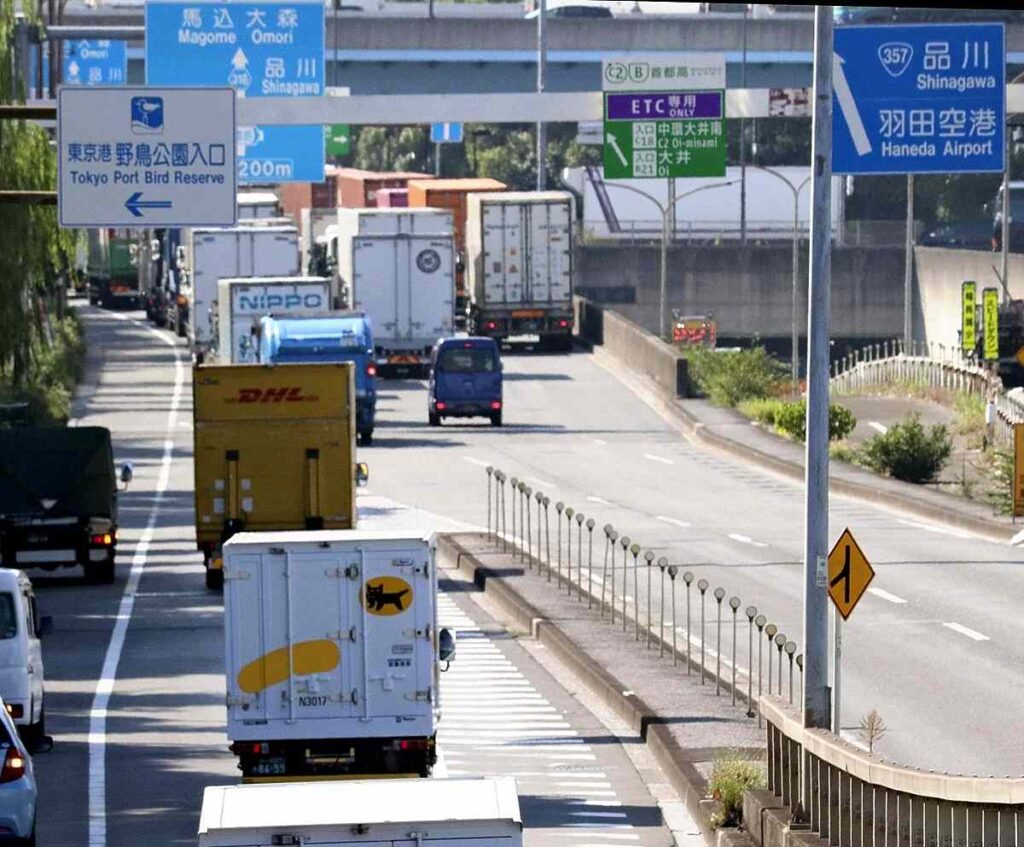Trucks maneuver through Tokyo.
17:42 JST, October 20, 2024
Fujio Uemura finds himself taking breaks after driving fish overnight to Tokyo, as new regulations impose limits that, according to trucking companies and industry experts, threaten to disrupt Japan’s logistics system and may lead to increased consumer prices.
The rules are designed to alleviate the burdens of a low-paying job in trucking and to attract younger workers in Japan, where road transport accounts for approximately 90% of goods movement. “In the past, I would drive as long as possible before stopping,” Uemura explained after completing a 1,000-kilometre (620-mile) journey from Oita in southern Japan with fresh fish.
“Long hours never bothered me. It’s just part of my job,” the fit 59-year-old said after stepping down from his refrigerated truck. As of April, truck drivers’ overtime is capped at a maximum of 960 hours annually, averaging 80 hours monthly, along with new regulations regarding breaks. Previously, there were no effective limits, and many drivers worked round the clock to increase their low earnings.
The Strain on Trucking
While essential to the world’s fourth-largest economy, the trucking industry in Japan occupies a precarious position. Though truck drivers typically work 20% longer hours than the average worker, their pay is about 10% lower, averaging around ¥4.5 million ($30,000) annually. Nearly one in five drivers logs over 60 hours a week.
Most of Japan’s roughly 63,000 trucking companies are small, with fleets of 10 trucks or fewer, and many have faced challenges even prior to the introduction of new regulations. They often survived by lowering prices or offering complimentary loading and unloading services, which are often done by hand. Drivers frequently spend hours waiting without extra compensation.
Future Capacity Concerns
Haruhiko Hoshino, a senior official at the Japan Trucking Association, noted that the new regulations could exacerbate existing issues. “Reducing drivers’ working hours will force us to decline jobs, leading to delays in deliveries,” he told AFP. Forecasts suggest that by 2030, Japan could have the capacity to move up to 34% less of its domestic cargo without significant reform.
Transportation Minister Tetsuo Saito described the situation as “urgent” and stated that the government is addressing it with considerable effort. The effects have already begun to appear, highlighted by reports of airports struggling to secure sufficient aviation fuel and delays in the delivery of fresh produce.
Adjustments and Responsibilities
The government has suggested that firms allow some flexibility for trucking companies and refrain from demanding discounts or free services. Ultimately, experts like Hiroaki Oshima, a professor at Ryutsu Keizai University, argue that this may mean consumers must pay higher prices to ensure fair compensation for drivers and transportation companies.
This presents a potential challenge for Japan’s new Prime Minister Shigeru Ishiba following elections on October 27. His predecessor, Fumio Kishida, faced declining popularity amid inflation and rising living costs. “In the end, who should bear the responsibility for fair compensation? It’s society, the senders and receivers of goods, and the consumers,” Oshima emphasized.
Uemura’s routine has changed; he now prepares for his journey to Tokyo in the afternoon after separate drivers conduct pickups for him. Portline Service’s manager, Katsuya Doi, commented that these adjustments incur an additional monthly cost of over ¥1.3 million ($8,750). “We are all affected; it shouldn’t just be us or our clients bearing these costs,” he expressed.
Despite the challenges, Uemura’s 35-year-old son has entered the profession after leaving shipbuilding. “I warned him that this job doesn’t allow for much sleep,” Uemura said with a laugh. “You earn more through hard work.”


